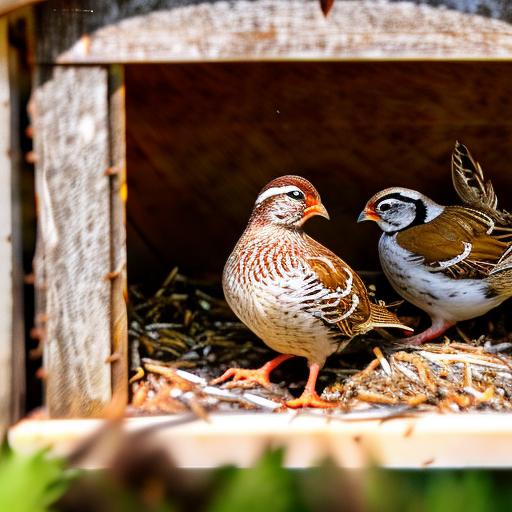Keeping quail in a chicken coop can be a rewarding and beneficial experience for poultry enthusiasts. Quail are small, low-maintenance birds that can thrive in a coop environment alongside chickens. They are known for their delicious eggs, meat, and pest control abilities, making them a valuable addition to any backyard flock. In this article, we will explore the various aspects of keeping quail in a chicken coop, including choosing the right breed, setting up the coop, feeding and watering, managing their health and well-being, integrating them with chickens, and tips for successful quail keeping.
Quail are known for their small size, gentle nature, and ability to lay eggs prolifically. They are also relatively quiet birds, making them suitable for urban or suburban settings where noise may be a concern. By keeping quail in a chicken coop, poultry keepers can maximize the use of their space and resources while enjoying the benefits of both quail and chickens. With proper care and management, quail can thrive in a coop environment and provide a valuable source of eggs and meat for the household.
Key Takeaways
- Quail can be successfully kept in a chicken coop, providing benefits such as pest control and egg production.
- When choosing a quail breed for your chicken coop, consider factors such as size, temperament, and egg production.
- Setting up the chicken coop for quail involves providing appropriate bedding, nesting boxes, and perches for roosting.
- Feeding and watering quail in a chicken coop requires a balanced diet and access to clean water at all times.
- Managing the health and well-being of quail in a chicken coop involves regular monitoring for signs of illness and providing a clean and safe environment.
Choosing the Right Quail Breed for Your Chicken Coop
When it comes to choosing the right quail breed for your chicken coop, there are several factors to consider. Different quail breeds have varying characteristics, such as size, egg production, temperament, and cold hardiness. Some popular quail breeds for coop keeping include Coturnix (Japanese) quail, Bobwhite quail, and California quail. Coturnix quail are known for their high egg production, docile nature, and adaptability to confinement, making them an excellent choice for coop keeping. Bobwhite quail are prized for their delicious meat and are often raised for hunting purposes, but they can also be kept in a coop setting for their eggs. California quail are known for their striking appearance and adaptability to various climates, making them a popular choice for backyard enthusiasts.
When choosing a quail breed for your chicken coop, it’s important to consider your specific needs and goals. If you are primarily interested in egg production, Coturnix quail may be the best choice for you. If you are looking for a dual-purpose breed that provides both eggs and meat, Bobwhite quail could be a suitable option. Additionally, consider the climate and environment in which you live, as some quail breeds may be better suited to cold or hot temperatures. By carefully evaluating the characteristics of different quail breeds, you can select the right breed that aligns with your preferences and goals for coop keeping.
Setting Up the Chicken Coop for Quail
Setting up the chicken coop for quail requires careful consideration of their specific needs and requirements. Quail have different housing and environmental needs compared to chickens, so it’s important to make appropriate accommodations for them within the coop. One key consideration is providing adequate space for the quail to move around and exhibit natural behaviors. While quail are small birds, they still require space to roam and dust bathe. Additionally, providing appropriate nesting areas for the quail is essential for egg production and their overall well-being.
In addition to space considerations, it’s important to provide suitable bedding material for the quail within the coop. Quail benefit from having soft bedding material such as straw or pine shavings to nest in and keep warm. The bedding should be kept clean and dry to prevent health issues and maintain a comfortable environment for the quail. Furthermore, ensuring proper ventilation within the coop is crucial for the health and well-being of both quail and chickens. Adequate airflow helps regulate temperature, reduce moisture buildup, and prevent respiratory issues in the birds. By setting up the chicken coop with these considerations in mind, poultry keepers can create a suitable and comfortable environment for their quail to thrive.
Feeding and Watering Quail in a Chicken Coop
Feeding and watering quail in a chicken coop requires attention to their specific dietary needs and behaviors. Quail have different nutritional requirements compared to chickens, so it’s important to provide them with a balanced diet that meets their needs. A commercial game bird feed or turkey starter feed is often recommended for quail, as it contains the necessary protein levels and nutrients essential for their growth and egg production. Additionally, offering supplemental treats such as mealworms, fruits, and vegetables can provide enrichment and variety in their diet.
In addition to providing appropriate feed, ensuring access to clean water is essential for the health and well-being of quail in a chicken coop. Quail are known to be avid drinkers and require constant access to fresh water throughout the day. It’s important to provide waterers that are suitable for their size and prevent spillage or contamination. Regularly cleaning and refilling waterers is crucial to prevent dehydration and maintain good health in the quail. By paying attention to their feeding and watering needs, poultry keepers can ensure that their quail receive the necessary nutrition and hydration to thrive in the coop environment.
Managing the Health and Well-being of Quail in a Chicken Coop
Managing the health and well-being of quail in a chicken coop involves proactive care, observation, and disease prevention measures. Regular health checks should be conducted to monitor the condition of the quail and identify any signs of illness or injury. It’s important to observe their behavior, appetite, droppings, and overall appearance to detect any potential health issues early on. Additionally, providing a clean and sanitary environment within the coop is essential for preventing disease and maintaining good health in the birds.
Furthermore, implementing biosecurity measures can help prevent the introduction and spread of diseases within the coop. This includes quarantining new birds before introducing them to the existing flock, limiting exposure to wild birds or pests, and practicing good hygiene when handling the birds or their equipment. Additionally, vaccination against common poultry diseases may be recommended depending on the region and disease prevalence. By taking proactive measures to manage the health and well-being of quail in a chicken coop, poultry keepers can minimize the risk of disease outbreaks and ensure that their birds remain healthy and thriving.
Integrating Quail with Chickens in the Coop

Integrating quail with chickens in the coop requires careful planning and consideration of their social dynamics and space requirements. While quail are generally peaceful birds, they may be intimidated by larger chickens or aggressive behavior within the flock. It’s important to provide adequate space within the coop to prevent overcrowding and reduce potential conflicts between the birds. Additionally, providing separate feeding and watering stations for the quail can help minimize competition with the chickens and ensure that all birds have access to essential resources.
Furthermore, observing the interactions between the quail and chickens is important during the integration process. Some chickens may be curious or territorial towards the new additions, so it’s important to monitor their behavior and intervene if necessary to prevent aggression or bullying. Providing hiding spots or elevated perches within the coop can also help quail feel more secure and reduce stress during the integration process. By taking gradual steps towards integration and providing a suitable environment for both quail and chickens, poultry keepers can successfully maintain a harmonious flock within the coop.
Tips for Successful Quail Keeping in a Chicken Coop
Successfully keeping quail in a chicken coop requires attention to detail, proactive care, and ongoing observation of their behavior and well-being. Providing suitable nesting areas with soft bedding material can encourage egg production and ensure the comfort of the quail within the coop. Additionally, offering enrichment activities such as dust bathing areas or hanging treats can provide mental stimulation and prevent boredom in the birds.
Regularly cleaning the coop, providing fresh bedding material, and maintaining clean waterers are essential tasks for ensuring a healthy environment for both quail and chickens. Monitoring their health through regular checks and being attentive to any changes in behavior or appearance can help detect potential issues early on. Finally, seeking out resources such as poultry forums or local breeders can provide valuable insights and support for successful quail keeping in a chicken coop.
In conclusion, keeping quail in a chicken coop can be a rewarding experience that provides valuable resources such as eggs, meat, pest control, and companionship within a backyard flock. By carefully selecting the right breed, setting up a suitable environment, providing proper nutrition and care, managing their health, integrating them with chickens, and following tips for successful keeping, poultry enthusiasts can enjoy the benefits of both quail and chickens within their coop environment. With attention to their specific needs and proactive management practices, quail can thrive alongside chickens and contribute to a diverse and thriving poultry flock.
If you’re considering keeping quail in your chicken coop, you may also be interested in learning about the compatibility of geese and chickens. Poultry Wizard has a helpful article on whether geese can eat chicken feed, which provides valuable insights into managing different poultry species together. Check out the article here to discover more about this topic.
FAQs
What are the benefits of keeping quail in a chicken coop?
Quail can help control pests such as ticks and small insects in the chicken coop. They also provide additional eggs and can help with the overall health and cleanliness of the coop.
What should be considered before keeping quail in a chicken coop?
It’s important to consider the space available in the coop, the compatibility of quail with the existing chickens, and the specific needs of quail in terms of food, water, and shelter.
How can quail and chickens coexist in the same coop?
Quail and chickens can coexist in the same coop as long as there is enough space for both species, and they are introduced to each other gradually to minimize stress and aggression. Providing separate areas for nesting and feeding can also help.
What are the housing requirements for quail in a chicken coop?
Quail need a separate area within the coop for nesting and roosting. They also require protection from predators and access to food and water that is suitable for their size.
What should be considered in terms of feeding quail in a chicken coop?
Quail have specific dietary needs and require a high-protein diet. It’s important to provide them with appropriate feed and ensure that they have access to it without competition from the chickens.
Are there any health concerns when keeping quail in a chicken coop?
It’s important to monitor the health of both the quail and the chickens to prevent the spread of diseases. Regular cleaning and maintenance of the coop can help minimize health concerns.
Meet Walter, the feathered-friend fanatic of Florida! Nestled in the sunshine state, Walter struts through life with his feathered companions, clucking his way to happiness. With a coop that’s fancier than a five-star hotel, he’s the Don Juan of the chicken world. When he’s not teaching his hens to do the cha-cha, you’ll find him in a heated debate with his prized rooster, Sir Clucks-a-Lot. Walter’s poultry passion is no yolk; he’s the sunny-side-up guy you never knew you needed in your flock of friends!







